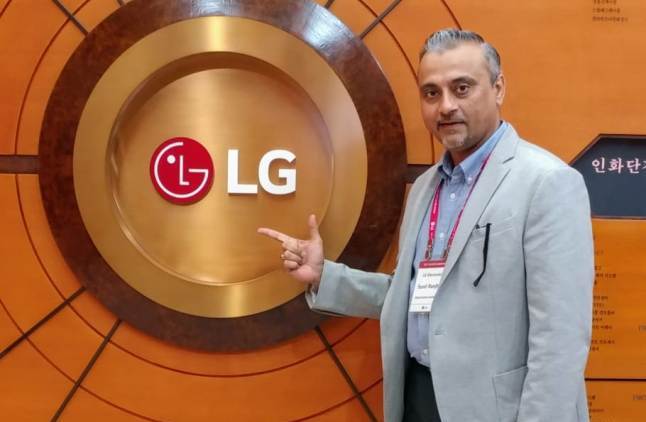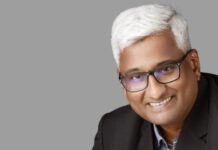In an exclusive conversation with SightsIn Plus, we’re benefited to have Sunil Ranjhan, Vice President and Head- Human Resources, India at LG Electronics. equipped with over 31 years of experience, spread across diverse industries, he has handled varied HR portfolios in renowned organisations handling Organizational restructuring, process re-engineering, Systems design, people related issues, talent management, training & executive development, industrial relations, employee engagement at both India and Asian countries. His career spans across multiple countries, including India, Japan, Thailand, Middle East and Africa.
Prior to LG Electronics India, Sunil has worked with number of leading organisations including Wipro Information Technology Ltd, National Productivity Council, JCT Electronics Ltd, Honda Cars India Ltd and Apollo Tyres.
Sunil is a regular speaker at the leading HR Forums in APAC region. In August 2016, he has also trained the Japanese Auto workers Union in Tokyo, Japan on their role in guiding the union movements in developing countries.
Q- You are a senior HR leader having profound working experience across the globe with fortune 500 companies. Tell us how you were able to shape up your rich career journey?
It’s been 31 years since I started my journey in HR. The HR function is highly visible and needs to evolve on a regular basis. Hence, to be agile today, it is most important to adjust to people and business needs. Since the very beginning I have focused on certain fundamentals firstly, always learn something new, learning is a continuous process, to stay ahead one should keep learning new skills. Strong continuous learning skills are required to successfully adapt to changing work and life demands.
Secondly, I would strongly suggest to document one’s experiences ( success, failures, regrets, mistakes, learning’s) & do reflection ; Japanese word is HANSEI- reflect good, bad & internalize learning’s. This philosophy helped me in compiling my first book “No right answers”. In the era of digital age everyone is sharing their thoughts on social media but sharing your career experiences and your thoughts in a private space ensures you’re in a better position to analyze your profession, reflect upon your experiences and goals, and you can plan for next steps as you grow in your career. Thirdly be flexible in taking new roles, responsibilities, I worked across countries in Japan, Middle East, Africa, Thailand & India. My work areas included customer service corporate planning in addition to HR. Working in a very different cultural environment helped me to rediscover the importance of the universal leadership qualities of openness, listening and empathy. I liked all my jobs as they provided me with a great opportunity to make a positive change in the organisation.
Last but not least, never say not possible, there is always a better way to find solutions. I believe that execution is everything, ideas are worth nothing unless executed.
Q- Out of 31 years rich career experience, mostly you have been with big manufacturing industries, what are the challenges HR are facing in manufacturing sector? And how to overcome with these challenges?
In manufacturing sector you have human resources from all strata of society; varying qualifications so HR policies programmes should cater to all. It should be an inclusive culture for the employees. Employee engagement has been a key focus for companies as they want to build a strong connect among employees so that workforce is motivated to achieve common goal. Another area of concern is motivation & engagement of casual workforce, in manufacturing industries there is a large manpower that is on contract , casuals, apprentices etc, many companies fail to connect with this pool leading to dissatisfaction. Many of these issues can be linked back to the sense of community in a workplace: if a casual employee doesn’t feel invested in the business it’s likely to impact on their performance. Employee engagement has been the key solution to this , meetings, informal gatherings and other team-based activities, it’s a great way to encourage mingling and build a sense of worth in both your casual and full time employees. HR teams should create engagement & learning platforms, so that there is no dissatisfaction. Retention of highly skilled & qualified engineers is also a challenge. Everyone wants to work in new age IOS/IT software. These employees wants to upgrade their skills & learn new technologies so certainly learning & development for this segment is very important.
Q- As manufacturing industries are evolving from manual process to advanced techniques and automation. What do you think the HR trends are coming in 2019?
Rather than just saying 2019, I would like to say for next 5 years the following trends will emerge-
- Automation will increase & there will be deployment of robots in areas like material movement, packing, loading, unloading from conveyors trucks etc. This may lead to reduction of temporary & contractual manpower who have been doing such roles.
- There will be reduction in shop floor accidents with deployment of advanced robotics & AI in machines.
- There will be a need for trained workforce to work on advanced robotics enabled machines. In coming years there will be an increase in the demand for manpower in supervisory, maintenance or administrative roles with valuable skill sets such as engineers who have specialized in machinery and robotics.
- Entry of millennial in the workforce. They will demand a cultural shift like flexible work timings & change in work environment.
- A lot of data-based HR decisions will be made in the future, and analytics will play a greater role in HR.
Q- Reports say 40% of the workforce will be Millennial by 2020 and organizations are becoming multi generational, what are your plans for retaining & engaging them?
Certainly engaging millennial needs a cultural shift . I would like to mention few traits & methods to engage them.
Providing a fun workplace-Millennial demand a different kind of work life. Organization should be an extension of university environment where they can enjoy working.
Flexibility in timings, designing a welfare program to suit their lifestyles –Completing to-dos and getting work done is more important to them than being recognized in the office as the first one to arrive and the last one to leave. Hence they would need flexible work schedules.
Connected workplaces with high level of automation etc. –Millennial, in particular, are driving the rapid evolution of automation in the workplace. Compared to previous generations, millennial are also quick to find, apply, and understand new technologies especially if it improves productivity and collaboration.
Focus on training & development to rapidly skill up--They need constant learning platforms & would prefer an organization where they could enhance their skills & learn new trends & technologies.
More flexibility to choose their career road maps & functions they would like to be in--Millennial are not going to settle for mediocre careers. Certainly they are passionate about their work & want to explore all possible functions. Millennial thrive on continuous feedback & mentorship. They would be looking at mentors who can inspire them & support when the work gets challenging.
Q- How do you see job opportunities in consumer durable industries for 2019 and near future?
Indian appliance and consumer electronics (ACE) market has already reached INR 2.05 trillion (US$ 31.48 billion). It is expected to increase at a 9% CAGR to reach INR 3.15 trillion (US$ 48.37 billion) in 2022*. Growing awareness, easier access, and changing lifestyles have been the key growth drivers for the consumer market. However in India penetration of consumer durables is still very low for ex. refrigerator it is 30% ; AC it is 5 % & washing machine is 17% ; TV penetration is still better at 66%. So according to me this industry will keep on growing for the next decade or so hence there are good opportunities in job market. Secondly with adoption of IoT, AI, smart technology in white goods it is the right time for technology workforce to join the R &D functions.
Q- What are your Talent strategy and the best HR practices of Talent Management at LG Electronics?
Our talent strategy rests on three pillars-
- Experience- we provide opportunity to people for new roles through regular job rotations transfers etc. In our in house surveys we have found out that majority of employees enjoy working across different functions & departments.
- Internal growth- we believe in growing our in house talent through job rotations; we are proud to say that 95% of our leaders are home grown. For e.g. all our regional business heads started their career as area managers. These leaders understand the grass root level concerns & they suggest pragmatic solution for business challenges.
- Performance driven recognition- As our MD always says reasonable amount of unfairness is fairness. Rewards, bonuses are decided on KPI achievements & promotions are linked to achievements.
Q- You are an influential HR leader, what is your the best piece of advice for HR professionals who want to be great at their job?
HR professionals should keep on developing their skills by continuously reading, learning, attending forums etc. For a vast learning they should work in all the verticals of HR (learning & development); human resources management, compensation & benefit etc). I also suggest having an exposure in industrial relations to have 360 degree understanding of HR. To be a successful HR professional one should learn business, understand finance & economy so that HR can be aligned with the emerging business needs. Communication plays a very important role in HR success, so develop communication skills to connect with all levels in the organization (from peers to president) & also your presentation skills should be impeccable. Lastly be proactive, volunteer to other roles in the organization in addition to HR for getting hands on business experience & exposure.
*IBEF (Indian Brand Equity Foundation)
Thank you Sunil!









